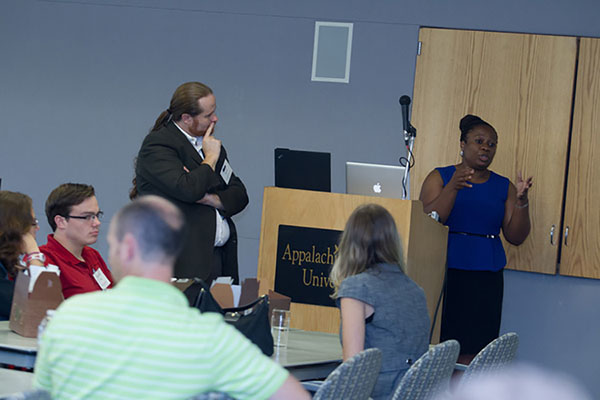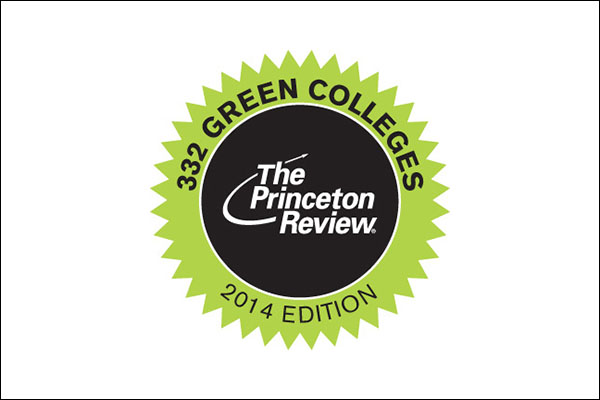BOONE, N.C. — For the past three years, Appalachian State University has been leading the way in transforming the University of North Carolina’s energy use and future through the annual Appalachian Energy Summit hosted on campus.
More than 250 campus leaders from across the system’s 17 institutions, as well as the state’s private colleges and universities, attend each year to share best practices and hear from leaders in energy efficiency. Undergraduate and graduate students also participate.
This year’s event is July 28-30 with the theme “The Disruption/Innovation Cycle.” Speakers include Amory Lovins of the Rocky Mountain Institute, Peter Kelly-Detwiler of NorthBridge Energy Partners LLC and David W. Orr, Oberlin College’s Paul Sears Distinguished Professor of Environmental Studies and Politics and senior adviser to the president.
The UNC system’s goal is to save $1 billion in energy costs over 20 years. Noted achievements include:
- Appalachian has amassed the largest and most diverse portfolio of renewable energy facilities in the state with wind, solar thermal and photovoltaic systems.
- N.C. State University powered down buildings on campus over winter break and saved more than $288,000, pushing its 10-year initiative to $2.5 million in total savings.
- UNC Charlotte has reduced its building’s energy usage by 24 percent per square foot, leading to over $3 million in avoided energy costs for the 2012-13 academic year.
5 long-term goals
The Appalachian Energy Summit is the annual gathering for the University of North Carolina Energy Leadership Challenge. It has five long-term goals:
- Educate students to be the leaders of tomorrow.
- Reduce and stabilize the UNC system’s average annual energy expenditures, currently equaling $1,000 per student. This includes focusing on initiatives that will cumulatively save the university system in excess of $1 billion over 20 years.
- Transform and stimulate the North Carolina economy through the support of Green Energy business infrastructure, creating jobs in the new energy economy.
- Position the University of North Carolina system and the summit’s private university colleagues as national leaders in sustainability education and for reducing reliance on environmentally damaging fossil fuels.
- Create a culture of environmental and economic sustainability across the UNC system through administrative leadership, student involvement, curricula development, campus operations, and new partnerships between the university, its benefactors and industry.
The Appalachian Energy Summit Mid-Year Meeting continues the event’s work through a day-long workshop hosted by another campus during the winter.
Great connections, rich conversations
“When over 250 professionals of this caliber gather, great connections and rich conversation always occur,” said Ged Moody, Appalachian’s sustainability director and organizer of the event.
“In addition, the summit’s working groups connect professionals by skill sets, interests and job responsibilities so they can collaborate year-round on activities in the areas of academic integration, campus-based energy efficiency, finance and regulatory opportunities, high-performance campus design, transportation opportunities, and student leadership and engagement.”
Moody said this year’s summit theme, “The Disruption/Innovation Cycle,” inclines participants to embrace the innovations that disrupt our time-tested technologies, processes and business models.
This year’s Appalachian Energy Summit is a carbon neutral event. Event organizers have reduced carbon emissions as much as possible and worked with Shift Equity and NC Greenpower to calculate and offset remaining emissions by purchasing renewable energy credits and carbon offsets.
Commitment to research, creativity, innovation and practice in sustainability is making a difference now, and for our future.
Chancellor Sheri N. Everts addresses participants in the third annual Appalachian Energy Summit at Appalachian State University.
What do you think?
Share your feedback on this story.
About Sustainability and Energy Management at App State
Appalachian State University’s leadership in sustainability is known nationally. The university’s holistic, three-branched approach considers sustainability economically, environmentally and equitably in relationship to the planet’s co-inhabitants. The university is an active steward of the state’s interconnected financial, cultural and natural resources and challenges students and others think critically and creatively about sustainability and what it means from the smallest individual action to the most broad-based applications. The university offers both undergraduate and graduate academic degree programs that focus on sustainability. In addition, 100 percent of Appalachian’s academic departments offer at least one sustainability course or course that includes sustainability, and all students graduate from programs that have adopted at least one sustainability learning outcome. Learn more at https://appstate.edu/sustainability.
About Appalachian State University
As a premier public institution, Appalachian State University prepares students to lead purposeful lives. App State is one of 17 campuses in the University of North Carolina System, with a national reputation for innovative teaching and opening access to a high-quality, cost-effective education. The university enrolls more than 21,000 students, has a low student-to-faculty ratio and offers more than 150 undergraduate and 80 graduate majors at its Boone and Hickory campuses and through App State Online. Learn more at https://www.appstate.edu.
















![How NCInnovation Is Rethinking Economic Development in North Carolina [faculty featured]](/_images/_posts/2026/02/rethinking-economic-development-600x400.jpg)






